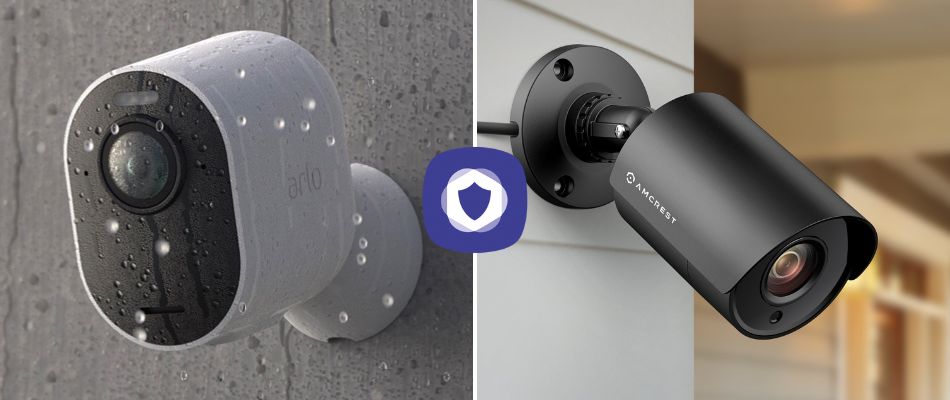If you’re looking to upgrade your home security with self-monitored, flexible security cameras, it’s no surprise that you’ve come across these two brands.
Amcrest was founded in 2013 and is headquartered in Houston, Texas. They offer an array of equipment, not just security cameras. Arlo was founded in 2014 and is a modern provider focusing on security cameras and smart home products.
Amcrest and Arlo can contribute a lot to your home security; let’s consider which is best for you.
Arlo vs Amcrest: What do they have in common?
- Flexibility: Amcrest and Arlo are best known for being flexible providers. You won’t be forced into paying for expensive long-term contracts.
- Night vision: Your cameras can keep your home safe anytime, as color night vision is offered with several of Arlo and Amcrest’s cameras.
- Pan and tilt cameras: Pan and tilt cameras can help you get a better view.
- Mobile app: Arlo and Amcrest offer high-quality mobile apps; the mobile apps will send you push notifications to help you keep your home safe.
- Battery-powered: Most equipment is battery-powered.
- Cloud storage: Cloud storage is offered by both.
- Indoor cameras: You can purchase indoor cameras, including baby monitors, from both Amcrest and Arlo.
- Wi-Fi cameras: You can purchase quality wireless cameras.
Arlo vs Amcrest: What are the differences?
- Motion tracking: Some Arlo cameras have advanced motion detection and motion tracking; Amcrest cameras lack motion tracking features.
- Two-way audio: Some Amcrest cameras don’t offer two-way talk.
- Installation: You’ll need to complete self-installation regardless, but Arlo’s is much easier. Amcrest has a more complicated installation process.
- Pricing: Amcrest cameras start at less than $50, Arlo offers affordable home security cameras, but they can’t beat that.
- Smart home integration: Arlo offers excellent smart home devices; Amcrest doesn’t offer much in this area.
- Free cloud storage: Amcrest recently advertised a one-year free cloud storage trial.
- Larger security camera systems: Amcrest offers comprehensive security systems, including NVR (Network Video Recorder) and DVR (Digital Video Recorder) security systems. Arlo offers individual indoor and outdoor security cameras.
Amcrest: What you need to know
Amcrest is a modern provider offering a variety of cameras, ranging from plug-in wire-free cameras to smart doorbells, wired systems, and NVR multi-camera packages. Let’s take a look at what Amcrest can do for you.
Installation
Since Amcrest offers a variety, the installation process isn’t easy to define. Wi-Fi cameras are very simple to install and are usually plug-and-play, but some (such as the PoE Amcrest) require a more complicated setup. You may want DVR and NVR systems professionally installed, but there’s no professional installation available.
Equipment
Amcrest offers a variety of home equipment, predominantly focused on video cameras, including:
- IP cameras
- DVR analog cameras
- POE (Power over Ethernet) cameras
- NVR’s
- Weatherproof outdoor camera
Amcrest offers high-quality, wide-angle cameras with great specs. The resolution is adjustable and continuous recording is offered.
Home automation
Alexa is the only significant third-party automation; Amcrest could do better. Customers can choose some dedicated smart products, though, including doorbell cameras.
Costs
Amcrest provides several types of UltraHD security cameras, from motorized outdoor cameras to bullet options, drones, and baby monitors.
The variety of products means it’s not easy to provide accurate pricing. Generally, individual cameras may start at around $40, and more comprehensive NVR systems reach $3000+. Most domestic users spend around $200-$300 on their system.
Nerd pros
- Customization: You can fully edit your camera to your requirements, including frame rate, motion zones, and sensitivity.
- No subscriptions: Monthly fees are optional unless you choose an upgraded cloud storage plan.
- Local storage: You’ll choose between MicroSD card storage and NVR/DVR systems, giving you better local storage options.
Nerd cons
- Limited integration: Amcrest doesn’t have the best smart home options; there’s a limited selection of products without significant extras.
- More complex install: Some products will require a tricky install which isn’t ideal for a DIY provider. You may want to stick to a Wi-Fi camera.
- No professional monitoring: You need to be comfortable with self-monitoring, as, despite motion sensors and push notification alerts, there is no professional monitoring. Though our SecurityNerd was advised that some third-party providers may integrate with Amcrest cameras, you won’t find a dedicated monitoring service.
Arlo: What you need to know
Arlo is a great home security provider focusing on smart home security; Arlo is one of the best home security systems if you’re looking for a simple installation without requiring complex wiring, ethernet, etc.
Installation
Arlo’s customers report easy DIY installation; the wireless cameras can be configured in minutes. Arlo’s video doorbells are the simplest product, taking just 5 minutes to get up and running. But all Arlo products are simple; you plug in the base station and set up the simple mobile app to get started.
Equipment
Arlo doesn’t offer some of the critical components of a smart home security system, but they do offer a variety of home security products, including:
- Arlo Ultra indoor/outdoor cameras
- Arlo Pro (2+3)
- Video doorbells
- Baby monitors
- Customizable floodlights
Some Arlo cameras offer 4k resolution, a 180-degree field of view, and cutting-edge de-warping technology.
Home automation
Arlo provides several automation options, plus baby monitors and doorbell cameras. The new “Works With Arlo” promises more smart home options in the future.
Integrations include Telguard, Wink, Apple Homekit, Amazon Alexa, and Google Assistant.
Pricing
Arlo offers individual doorbell cameras from $80, and indoor/outdoor cameras start from $129 for a basic essential camera. You can access discounts for buying in bulk, and you should preplan what you need to get the maximum discount.
Nerd pros
- Smart item detection: Arlo cameras offer advanced motion and smart item detection, reducing the risk of false alarms.
- Brilliant video quality: Arlo’s camera options have HD video quality, with at least 1080p HD resolution. The Ultra has 4k resolution, which is something most companies can’t offer.
- No contracts: Like Amcrest, you’ll have plenty of flexibility, and you won’t be forced to take out a long-term contract.
Nerd cons
- Battery life: Arlo doesn’t have the best battery life compared to some competitors, which is a shame since they offer so much battery-powered equipment.
- Higher upfront cost: Since you can’t spread the cost, the upfront costs are higher than some providers.
Arlo or Amcrest?
Arlo and Amcrest offer high-quality 4k resolution cameras with good viewing angles if you’re looking for the best security cameras. The main difference is that Amcrest is more suited to a full surveillance system with DVR and NVR options, but Arlo is more suited to a small home security setup. Arlo specializes in smart home security and has compatibility with plenty of Z-wave products. Arlo has some of the best wireless security cameras, but Amcrest is better for a larger CCTV setup.
Get Arlo cameras Get Amcrest cameras
This article has been reviewed and approved by Officer Banta.

Officer Banta is the official SecurityNerd home security and safety expert. A member of the Biloxi Police Department for over 24 years, Officer Banta reviews all articles before lending his stamp of approval. Click here for more information on Officer Banta and the rest of our team.

